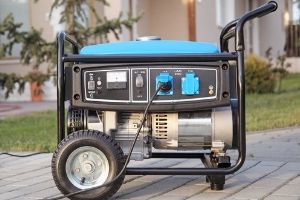With June comes the start of hurricane season, and for residents in and around Port St. Lucie, it can be a scary time of year. While we’ve dodged some major storms in recent years, if there’s one thing to learn from the destruction caused in other areas, it’s that hurricane preparedness is essential for your safety.
Although you’re never sure whether a storm will be a direct hit or whether it may weaken, in the past year alone, hurricanes have caused billions of dollars in property damage as well as claiming dozens of lives, leaving the hardest-hit communities utterly devastated.
Whether it’s mapping out a clear, detailed evacuation plan with your loved ones or gathering the requisite supplies, planning and preparing are essential tools that are absolutely worth the time and effort to ensure your personal safety. If you’re not sure how to start planning, read on to learn five tips that’ll help you stay organized and calm, rather than panicked and vulnerable during this hurricane season.
1. Make a Plan

It’s much easier to make a clear and well-thought-out plan when you have the time to discuss the decision and research your options. Think of the haunting images broadcast on the news of cars jam-packed on the highways on the eve of Hurricane Katrina desperately trying to flee the Gulf Coast, utterly trapped.
If you and your family determine that your best option is to evacuate ahead of a hurricane, outline a plan of exactly where you’ll go, how you’ll get there, and if there are alternative routes to get to your destination.
Make sure to also have a backup destination in mind, along with clear navigation instructions printed out ahead of time so that you don’t have to rely on your phone. Notify your extended family of your planned destination (and backup location) so that they will be able to reach you.
Also, establish a meeting place where you and your family members can find each other in the event you are separated. If you own pets, double-check that your selected evacuation destination (and backup location) are pet-friendly. It’s a small but necessary step to ensure that your four-legged friends don’t wind up in peril during a storm.
2. Research an Evacuation Route

As previously mentioned, it’s important to establish an evacuation route far ahead of time, and familiarize yourself with it. Remember, cell phone service can be interrupted if nasty weather hits, and relying on your phone to navigate should not be your only method of reaching your destination.
Even if you have a car charger, you cannot rely on your battery to keep up for navigation, phone calls and so forth. Have printed directions and maps ready, including primary and secondary routes.
Know the overview of the steps and possible detours you can take to avoid road closures and heavy traffic. Make sure to have the contact information for your primary and secondary destinations readily available so that you can confirm your accommodations prior to your departure.
3. Staying at Home? Make Sure You Have a Generator

Losing power for a few hours can be kind of fun; lighting candles and playing board games by flashlight. Losing power for an extended period of time (in some extreme cases, for several weeks) can be utterly disastrous.
Having a generator is more than just a good idea if you plan on staying home and weathering the storm; it’s a necessity. It’s not uncommon for power outages to last for days in the aftermath of a storm.
This can mean no access to clean water, no refrigeration or use of appliances, no air conditioning, no television or internet for emergency updates, and certainly no way of powering ventilators or other medical equipment once the emergency battery supply has run out.
Double check that you have plenty of fuel, as it is likely to be in short supply when a hurricane is already in the forecast. Verify that you know how to operate the generator and that it’s working properly. If you’re looking for a simpler option, be sure to find out about whole home generators, which can be integrated into your power supply beforehand.
Also, be sure to set a specific area of your home to fall back to in the event things really take a turn for the worst. Generally, a room away from windows and on the “interior” of your home is the best bet.
4. Check Your Insurance Policy

Enduring a hurricane can be traumatic enough. Imagine not only sustaining massive damage to your home and the contents within it, but then the aggravation and heartbreak of submitting an insurance claim and having it denied due to a technicality that you missed.
Insurance policies are long, detailed and often confusing. However, as a homeowner or renter, it’s important that you read through the fine print to determine if you have adequate insurance to cover your real and personal property in the event of a hurricane. Part of hurricane preparedness is knowing what’s covered and what’s not.
To avoid having an insurance claim for hurricane damage denied due to a technicality, read through the policy well in advance, and discuss any questions you may have with your insurance agent. It may mean a slight increase in your premium, but it can also mean hundreds of thousands of dollars if your home sustains enough damage.
5. Gather Supplies

![]()
You’ve probably seen plenty of images of grocery store shelves left completely empty ahead of a hurricane. People stock up on the essentials in a panic, and you don’t want to be stuck driving from store to store in search of bottled water and batteries when the rain starts to fall. Have a kit ready now, consisting of:
- Flashlights
- Batteries
- Several days’ worth of non-perishable food that does not require heating
- Bottled water
- Medication
- Pet food (if applicable)
- First aid supplies
- Emergency Radios
- Candles
- Infant formula (if applicable)
- Portable cell phone chargers
- Manual can openers
- Plenty of blankets
- Personal hygiene products, including wipes and toiletries
Basically, anything you can think of that you might need in the event there’s no power or easy access to the store, you should have in bulk. Remember, hurricane preparedness means leaving nothing to the last minute. Taking the above five steps will help you and your loved ones to stay safe in a perilous situation.
If you should have any questions about using your generator or any of your other electrical-related needs, Elite Electric & Air is here to help. Our licensed contractors can help you plan ahead and be prepared for hurricane season.

